media navel gazing
let's talk about all three of these dudes [Bryan Fuller]
Chris Evans: already good? I'm a wee bit skeptical about these numbers because I seem to remember Chris Evans breaking some tackles and running for a gorillion yards when it was 49-0 against Rutgers, but, uh:
Chris Evans returns after a sensational freshman season in the Maize and Blue as the Big 10's most elusive returning RB. pic.twitter.com/NQb7w1EO01
— PFF College Football (@PFF_College) July 3, 2017
No Saquon Barkley is a surprise. (He's not even 4th, which goes to Maryland's Ty Johnson.) Enough of a surprise that I look at this stat with a bit of a jaundiced eye. It looks like it heavily favors guys who end up in certain situations but not others. Wadley and Evans were insulated from short yardage situations by LeShun Daniels and De'Veon Smith, respectively. And the whole Maryland offense was geared towards getting little quick guys in space one on one. The context is important.
This one might be better?
In 2016, these were the most effective freshman running backs on a per carry basis after contact with a defender. pic.twitter.com/0zyNCDrGJA
— Aaron Resnick (@aaronmresnick) June 28, 2017
I still think that's about Evans breaking the occasional tackle and getting a huge play than anything De'Veon Smith-esque. Huge plays are good, don't get me wrong—I am just worried about sample size. Better to have Evans on these lists than not; maybe not super predictive about the season.
Less skeptical about this one. Michigan's DL is going to be just fine this fall.
Michigan and Ohio State are the only schools returning multiple 4-3 ends who finished in the top 20 nationally for pass rush productivity. pic.twitter.com/XNuV7KRBgL
— Aaron Resnick (@aaronmresnick) June 26, 2017
Bosa and Winovich are in fact #2 and 3 nationally, behind only Harold Landry—another Don Brown acolyte. Meanwhile the new DEs were actually more productive against the run than the departures:
The Michigan defense should be solid against the run this season, despite the loss of Charlton and Wormley. pic.twitter.com/krPa1z6Cnl
— PFF College Football (@PFF_College) July 2, 2017
That one may be a garbage time artifact. Even if you haul those numbers back down to Wormley/Taco level that's pretty dang okay, and we haven't even talked about Mo Hurst.
BRILLIANT
Exit Fox Sports Dave Brandon. A spectacular final act for carnival-barker Jamie Horowitz at Fox Sports. Step one is gutting the profitable(!) Fox Sports digital team in order to consolidate his hold on power, with a side of implementing his post-apocalyptic vision:
What really does work is when you take things are good like ’11 Coaches Oregon Might Hire’, that might be something someone is interested in the day Helfrich gets fired, and we change to ‘Colin Cowherd’s 11 Coaches.’ We’ve seen this be very successful. You look at Fox News right now, O’Reilly and his take. That’s all it is. And there are many different ways.
Step two is getting fired literally the next week.
Jamie Horowitz’s dismissal Monday came about a week after Fox began investigating allegations of sexual harassment in the workplace in its sports division. The company interviewed several women at L.A.-based Fox Sports about Horowitz’s behavior, according to a person familiar with the investigation who was not authorized to publicly discuss it.
The women included prominent on-air personalities and show producers, according to two people who requested anonymity because of the sensitive nature of the investigation.
Lawsuits will follow as Horowitz tries to collect on a contract and Fox Sports tries to separate itself from an alleged sexual harasser. Unfortunately for Fox and their writers, there appears to be no way to re-spool the thread.
A bloody few weeks in online #content have caused a round of introspective articles about "pivoting to video," and why that's exec-speak for "I give up, eat at Arby's." Bryan Curtis:
Why this is happening is simple: The web has a surplus of copy versus advertising. Companies have decided that sticking an ad at the front of a video makes it less ignorable than putting a similar ad next to an article. It doesn’t matter what the video is. I often get a paragraph or two into a Sports Illustrated story only to find Madelyn Burke in the lower right-hand corner of the screen, giving me a summary of the sentences I’m already reading.
The new round of layoffs ignited a lousy ritual. “Hire these people!” we tweeted at … whom, exactly? A word-friendly publication that would promise to never, ever pivot to anything else? The contact information for Vocativ’s “free agents” was sent around on a spreadsheet.
Other writers tried to play media visionary and stepped in it. “I’ve been in digital media for 12 years,” Sports Illustrated’s Andy Gray tweeted last week. “One thing I’ve learned is that nobody wants to read anything over 1,000 words. MTV is more proof.” Never mind that Gray’s employer uses the motto “longform since 1954.”
On Twitter, Gray got the noogie he deserved. I enjoyed reading his replies. They proved that no occasion, not even an existential threat to the industry, will prevent a journalist from citing his old articles — and, in this case, also providing the word count. Why, my recent longform piece was actually quite popular!
There are two kinds of online video. One has video content. Like this:
Delightful.
The other kind of online video does not have video content, whether it's a talking head repeating what someone else said or a poorly lit podcast-on-youtube-for-some-reason with horrible audio. These are stuck next to the actual written content you want, set to autoplay, and nowadays they even follow you around when you scroll down. They exist only to scam advertisers willing to play high CPMs for ads on video content. The problem, of course, is that these videos only have written content repurposed badly. No hamsters anywhere. They are never watched. At best they run in the background of someone's work computer, on mute.
Scout's bankruptcy and firesale was easily predicted by their own pivot to video. I can't tell you how many times I've clicked on a Scout article hoping for information on a recruit only to be presented with a video. Once in a while this seems useful enough for me to transcribe, and I do so. Half the time I decide to do this I can barely hear the #content because they taped it outside on a phone in high winds.
I dunno what the solution to online content is but I do know that scamming people is not it. Making your product worse by turning it into a tedious video instead a searchable, skimmable article is also not it. Until someone trains a hamster to recite your text, video is strictly worse for most content.
Penn State skepticism. Various folks on this here blog have been trying to elucidate why we're not as high on Penn State as most folks. Mostly it comes down to "their all-bomb offense was pretty lucky," and here's a stat to back that up:
Good stat from Phil Steele that matches the eye test:
— Chris Vannini (@ChrisVannini) June 28, 2017
Penn State came down with ~75% of 50-50 balls last year. McSorley bailed out a lot.
That conversion rate on jump balls is almost certainly unsustainable and PSU will have to make up for it elsewhere. They've got a shot at doing so because they bring back a lot from last year's team.
Drake yes? Drake no? Per Sam Webb, Drake Johnson did get approved for a sixth year in various sports:
Drake Johnson has finally been approved for 6th yr in fball, indoor & outdoor track. Now discussion on whether he'll play all 3 can commence
— Sam Webb (@SamWebb77) June 28, 2017
Whether he'll actually come back for football is an open question. Webb reported that he's 1) down to 180 and 2) very fast, so there's a role for him in both football and track. With a wonky hamstring that might not like stop-start, you could hardly blame him for packing it in and just running track.
Michigan has the room, FWIW.
Etc.: Buccigross survives, gets new five year deal. The Elite 11 is basically garbage for predicting QBs. That Bamba cash thing isn't going anywhere. The fullback is dead in the NFL. Assistant coach names. Talking with Mel Pearson. A reason to huddle?
[Comments temporarily turned off while we fix an issue]
The Question:
What's the Future of Sports Media like?
The Responses:
BiSB: Very Professional Podcasts.
David: Visual podcasts.
Ace: A vast web of two-minute autoplay videos with 30-second ad lead-ins.
Brian: Why is autoplay even an option? Why have you forsaken us, computer scientists?
Seth: Ask the legions of ad network peddlers who got my email when I joined the IAB newsletter. Someone saw on a spreadsheet that videos get incrementally higher ad rates and took this to all the board rooms in America.
Brian: It can't be incremental, can it? It has to be vastly different for the level of effort everyone is putting into video nobody watches
Seth: Rates are so dependent on so many factors that any generalization is necessarily incremental.
Brian: Anyway, it seems to me like there are a few different models for sports content that are viable. I would like you guys to guess at the models.
Ace: Grantland. RIP.
Seth: /giphy pours one out
Brian: Boutique prestige content is indeed one.
- PROS: good content written by people who don't feel like monkeys in the click factory.
- CONS: apparently doesn't make money? I kind of dispute that Grantland didn't make money because it couldn't, especially given the immediate and huge success of Simmons's podcast.
Seth: Obviously we’re rooting for this one. It depends on the media environment. The market of people who want to think long and hard about anything is so small I spent most of my life not knowing we were even a demographic. In a consolidated market like cable TV, the easy numbers favor the lowest intellectual demographic, so that becomes the ONLY market served (Hi TV news!). The internet is an open environment, so boutiques can find their market.
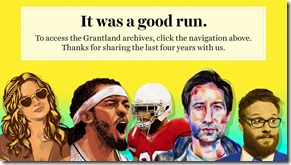 |
| Not forgotten |
But they have to grow from the bottom-up. Grantland could be making money, but ESPN was structurally incapable of understanding how or why it did. Nobody who thinks putting Skip Bayless or Steven A. Smith on TV is a good idea knows the first thing about marketing to people who fire off braincells for fun. The best thing for everybody would have been to spin it off.
Ace: The other issue with those prestige sites is writers tend to get snatched up. Grantland was a pretty unbelievable collection of talent that The Ringer has had a hard time replicating.
Brian: Yeah, a lot of them want to move on to doing other things because they can. This is not so much an issue with Graham Couch.
The ringer is also stuck on Medium, which is a terrible decision because it feels like a part of something instead of its own thing. That's fine if you're yet another Gannett site but bad if you're trying to be bougie.
Other boutique prestige shops include VICE Sports, The New York Times, Sports on Earth, and The Classical. The former two are parts of much larger organizations, the latter two basically died and live on as husks that don't pay many people.
So this is a dodgy and ephemeral way to live.
[Hit the JUMP for other ideas, like not paying for trash, more diagrams, or embracing “Embrace Debate.”]
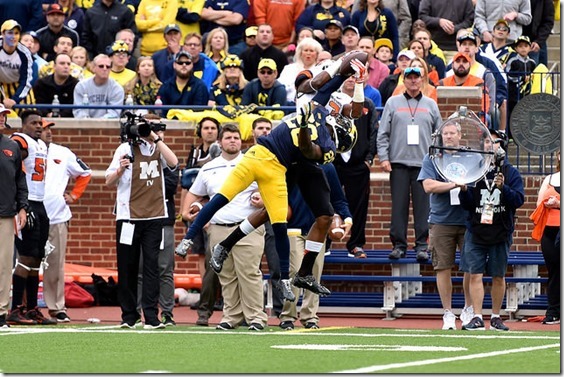
[Bryan Fuller]
Early entry tea leaves. In a welcome change, Michigan has a number of underclassmen good enough to consider entering the NFL draft. This, unfortunately, brings with it the possibility that some of these folks will actually enter said draft. A brief rundown:
- Jake Butt said he would definitely come back if he wasn't projected to go in the top three rounds. Mel Kiper has him the second tight end available and NFL Draft Scout just posted a mock in which he is a third rounder, which seems low. Butt told reporters that "it's 50/50" yesterday. More encouragingly, he listed many reasons for a return and a desire to talk to Harbaugh about what he should do. [UPDATE: Butt tweeted he'd be back.]
- After a confusing interval in which Chris Wormley deflected questions about not returning for a fifth year, he apparently told reporters he would "definitely" be back.
- Jourdan Lewis offered up another tweet indicating he would return next year. He is doing his homework. QED. And another after some radio person urged him to go—said radio person, Mike Sullivan, is the producer of Michigan's IMG pregame show. Excellent career move, Mike.
- Willie Henry has not been heard from on this front. He is currently under the radar to NFL draft sites but if he wants to go he will get drafted at some point. There have been some rumblings that he would look to go if he met a certain threshold in his draft projections.
Michigan has several other draft-eligible players with remaining eligibility but none seem like serious threats to leave. The O/U on departures is set at 1.
In other Jourdan Lewis news. He is a first-team All-American to USA Today, which I now like better than the Thorpe committee until the next time I have to evaluate my relative preference for things based on my pre-existing opinions.
We are hungry for things. Michigan sold out its bowl allotment in hours.
Our bowl tickets allotment is officially sold out. Thank YOU, fans, for doing your part! Can’t wait to see you down in Orlando! #GoBlue
— Michigan Football (@umichfootball) December 8, 2015 This is why they always get the top spot they could possibly get picked for. Michigan also implemented a system where fans could reserve bowl tickets for specific games and not others earlier this year, so they probably had a big head start on moving through those tickets. Even so… dang. I didn't know that was even a possibility any more.
Let's check in on Rutgers. The New York Times notices that Rutgers exists for a brief moment:
With the coach went the university’s athletic director, who never entirely recovered from suspicions that Rutgers had failed to vet her hiring two years ago. That was to replace the previous athletic director, who was fired along with the basketball coach after a video, looped repeatedly on national television, backed up allegations that the coach verbally and physically abused players — and that Rutgers had known about it.
And the bad news may not be over: The university is investigating whether the athletic department ignored its own policy requiring the dismissal of players who fail drug tests, as one told prosecutors after his arrest.
What a good organization to admit to the Big Ten. Rutgers doesn't get a full cut until 2021, which will be just in time for the league to kick them out in a world where the cable bundle has evaporated into countless disparate streams. Is there another article about that now?
No amount of wishing upon a star at the Disney offices in Burbank or the ESPN offices in Bristol, Connecticut, can hold back the forces of consumer choice that the Internet has unleashed. As a cable industry executive put it to Sports Business Daily recently, “The cost of goods is going up and sales are going down…that’s not a good trend.”
Every participant in the sports economy—franchise owners, athletes, programming networks, cable companies, and even the fans themselves—have benefitted from this broadband version of the hide-the-ball trick. That big fat $100 average household cable bill that everyone pays has served as a siphoning conduit of cash forcibly flowing from fan and uninterested non-fan alike.
The brazen economics of modern sports are being revealed and dismantled by the Internet, and the coming fumble-pile of desperate industry participants should make for some great viewing. That’ll be bad news for $30 million-a-year over-the-hill third basemen, the greater fools who pay them, and the unknowingly subsidized superfans who love them.
Yes.
This is probably a good joke. I don't understand econ jargon, but those of you who do may enjoy this tweet.
(Ryan marrying our Econ stats teacher) Priest: Do you take this woman to be your lawfully wedded wife? Ryan: I fail to reject
— Graham Glasgow (@gglasgow61) December 8, 2015 I hope this was a good tweet.
I was going to put this in the mailbag but it took so long to read this that I had to go have a lie down. A reader asked for an opinion on a very long meditation on "access" going the way of the passenger pigeon by John Herrmann of the Awl.
If you're unfamiliar with Herrmann, I mostly come across him when he writes exhaustingly nihilist pieces about the changes the internet is forcing on content providers. (He recognizes this: "The Content Wars is an occasional column intended to keep a majority of Content coverage in one easily avoidable place.") They are full of bloopers from robotics competitions repurposed into depressing metaphor gifs. Each accurately diagnoses something going on and collapses, like the robots, into a pile of loathing at the end. This one is no exception.
But, yes, access. It's difficult to find the summarizing quote to pull in a piece that's seemingly UFR length. I guess here's this bit on sports:
A world in which the NFL doesn’t need TV would be a world in which the NFL really doesn’t need a traditional outside press corps. To that end, perhaps, ACE is a new media company created by the NFL Players’ Association that hopes to succeed by “leveraging… exclusive group player rights and access to more than 1,800 active players to produce compelling sports-lifestyle content focused on athletes.” This month, a player for the Jets is suggesting to reporters, apropos of not very much, that reporters have too much access to players in the NFL, which is arguably the most restrictive league in professional sports. Also this month, when Kobe Bryant announced his retirement, he didn’t give an exclusive to a reporter who had covered him for years, or to Sports Illustrated, or to anyone. He published it as a personal post on the Player’s Tribune, a first-person platform for athletes founded by Derek Jeter and open to all major sports. (NASCAR? Sure!) The rest of the sports media, again, wrote its stories anyway.
A lot of the handwringing over loss of access strikes me as ludicrous. What's being removed is not really access but "access," that fiction in which a person of interest pretends to give something so a writer can pretend to critically evaluate the thing the person of interest said. When Rasheed Wallace blew that fiction up a lot of people got really mad:
And I guess if your job consists of surrounding the things that other people said with some sentences to link them together that would be a… actually, wait. "Both teams played hard" makes your job easy. Getting mad at that is not about whether your ability to do your job has been compromised, it's getting mad at Rasheed Wallace for yanking away the curtain on the City Animals presser you've been having for decades.
Back when MGoBlog stuck its toe into the access pool it felt like a trap. It still feels like a trap, because if someone gives you something they can take it away. Relying on access is like relying on Twitter's API—you can make the best third-party client in the world but Twitter's going to pick a winner and then you're going to die if you're not that winner. Then Twitter's going to buy that winner because if they're picking a winner, Twitter seems like a pretty good one.
So we have access, but we don't rely on it. Of late Adam's gotten some one on one time at media availabilities and used it to get some interesting stuff. We'd miss it if it was gone. But it wouldn't kill us.
If you are in business with someone who can kill you with no repercussions to themselves, you are on death row. Some people figure this out and go become lawyers. Some don't.
Michigan, and colleges in general, are less likely to cut people off like the NFL is definitely, definitely going to do in the near future. They are (mostly) public institutions with a point of view on press freedoms (sort of) subject to FOIA. But that doesn't change the fundamental law content in the internet age: be the quote, not the quoter.
Etc.: A list of all the weird and unfortunate things that happened while Cody Kessler was at USC is a very long list. Chad Catt looked pretty good in the second half of the Saturday Wisconsin game. Doyle is sweaty.
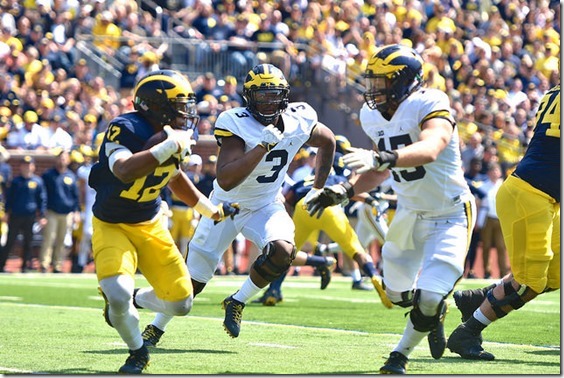
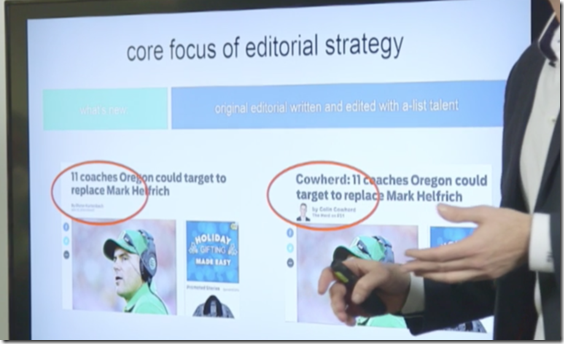
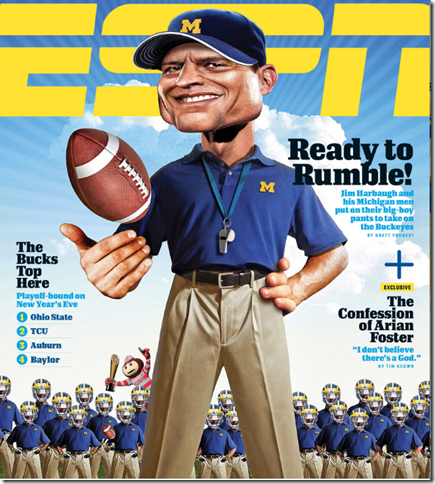

85